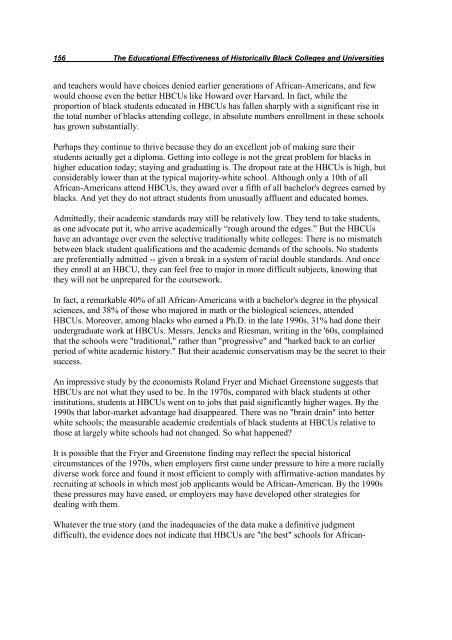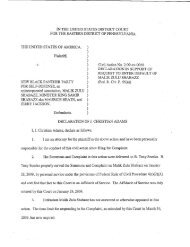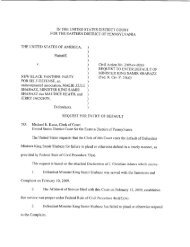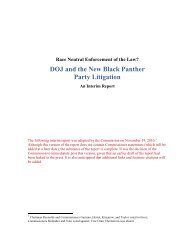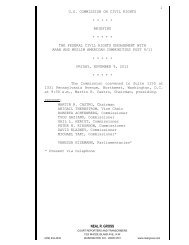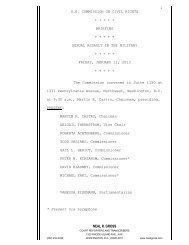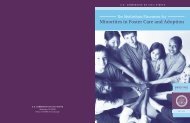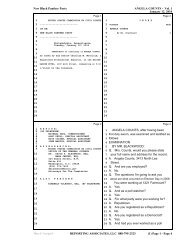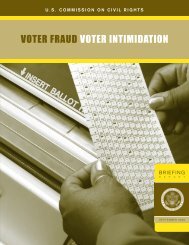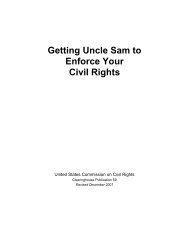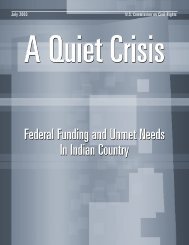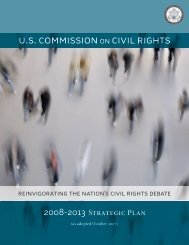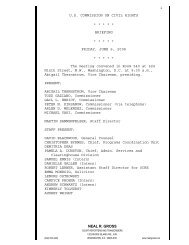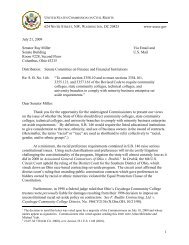The Educational Effectiveness of Historically Black Colleges and ...
The Educational Effectiveness of Historically Black Colleges and ...
The Educational Effectiveness of Historically Black Colleges and ...
You also want an ePaper? Increase the reach of your titles
YUMPU automatically turns print PDFs into web optimized ePapers that Google loves.
156 <strong>The</strong> <strong>Educational</strong> <strong>Effectiveness</strong> <strong>of</strong> <strong>Historically</strong> <strong>Black</strong> <strong>Colleges</strong> <strong>and</strong> Universities<br />
<strong>and</strong> teachers would have choices denied earlier generations <strong>of</strong> African-Americans, <strong>and</strong> few<br />
would choose even the better HBCUs like Howard over Harvard. In fact, while the<br />
proportion <strong>of</strong> black students educated in HBCUs has fallen sharply with a significant rise in<br />
the total number <strong>of</strong> blacks attending college, in absolute numbers enrollment in these schools<br />
has grown substantially.<br />
Perhaps they continue to thrive because they do an excellent job <strong>of</strong> making sure their<br />
students actually get a diploma. Getting into college is not the great problem for blacks in<br />
higher education today; staying <strong>and</strong> graduating is. <strong>The</strong> dropout rate at the HBCUs is high, but<br />
considerably lower than at the typical majority-white school. Although only a 10th <strong>of</strong> all<br />
African-Americans attend HBCUs, they award over a fifth <strong>of</strong> all bachelor's degrees earned by<br />
blacks. And yet they do not attract students from unusually affluent <strong>and</strong> educated homes.<br />
Admittedly, their academic st<strong>and</strong>ards may still be relatively low. <strong>The</strong>y tend to take students,<br />
as one advocate put it, who arrive academically “rough around the edges.” But the HBCUs<br />
have an advantage over even the selective traditionally white colleges: <strong>The</strong>re is no mismatch<br />
between black student qualifications <strong>and</strong> the academic dem<strong>and</strong>s <strong>of</strong> the schools. No students<br />
are preferentially admitted -- given a break in a system <strong>of</strong> racial double st<strong>and</strong>ards. And once<br />
they enroll at an HBCU, they can feel free to major in more difficult subjects, knowing that<br />
they will not be unprepared for the coursework.<br />
In fact, a remarkable 40% <strong>of</strong> all African-Americans with a bachelor's degree in the physical<br />
sciences, <strong>and</strong> 38% <strong>of</strong> those who majored in math or the biological sciences, attended<br />
HBCUs. Moreover, among blacks who earned a Ph.D. in the late 1990s, 31% had done their<br />
undergraduate work at HBCUs. Messrs. Jencks <strong>and</strong> Riesman, writing in the '60s, complained<br />
that the schools were "traditional," rather than "progressive" <strong>and</strong> "harked back to an earlier<br />
period <strong>of</strong> white academic history." But their academic conservatism may be the secret to their<br />
success.<br />
An impressive study by the economists Rol<strong>and</strong> Fryer <strong>and</strong> Michael Greenstone suggests that<br />
HBCUs are not what they used to be. In the 1970s, compared with black students at other<br />
institutions, students at HBCUs went on to jobs that paid significantly higher wages. By the<br />
1990s that labor-market advantage had disappeared. <strong>The</strong>re was no "brain drain" into better<br />
white schools; the measurable academic credentials <strong>of</strong> black students at HBCUs relative to<br />
those at largely white schools had not changed. So what happened?<br />
It is possible that the Fryer <strong>and</strong> Greenstone finding may reflect the special historical<br />
circumstances <strong>of</strong> the 1970s, when employers first came under pressure to hire a more racially<br />
diverse work force <strong>and</strong> found it most efficient to comply with affirmative-action m<strong>and</strong>ates by<br />
recruiting at schools in which most job applicants would be African-American. By the 1990s<br />
these pressures may have eased, or employers may have developed other strategies for<br />
dealing with them.<br />
Whatever the true story (<strong>and</strong> the inadequacies <strong>of</strong> the data make a definitive judgment<br />
difficult), the evidence does not indicate that HBCUs are "the best" schools for African-


